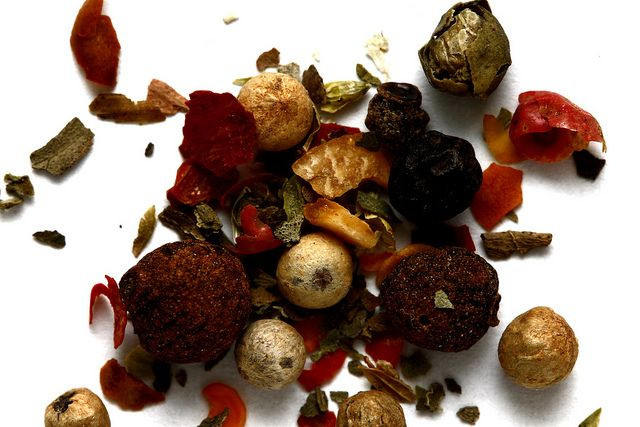Spices Improve Health In McCormick Study, But Not All Benefits Are Biased

Spices and herbs create a domino effect of healthy eating, according to research presented during the McCormick Science Institute Science Summit earlier this year. You know... McCormick, the company that manufactures spices and herbs. Totally not suspect at all.
Dr. Johanna Dwyer, a professor of medicine and community health at Tufts University School of Medicine in Boston, said in a press release that each paper and presentation (a total of 16) found a strong link between flavor and public health. "We now understand that spices and herbs have a meaningful role to play in bringing flavor to the forefront of today's health and wellness conversations," she explained. "It will take all of us working together — from scientists to chefs and product developers to policy makers — before we can really begin to improve public health through flavorful eating."
This meaningful role applies to several aspects of a person's health. One, as presented by Dr. James Hill from the University of Colorado and the Anschutz Health and Wellness Center, involves diet, where spices and herbs work to make low-fat meals more appealing; a particularly healthy strategy for those struggling to cut back on high-fat food. Another study from Johns Hopkins found spices and herbs cancel out the need for sodium, a staple flavor-booster (and potential cause of cardiovascular death). Additional presentations suggested the spice cabinet could also be a source of more energy, metabolism, as well as insulin sensitivity.
Based on these findings, Dr. Guy Johnson, executive director of the McCormick Institute, proposed increasing education on the benefits of spice and herbs in classrooms, donating money toward further research, as well as including spices and herbs in the dietary guidelines for Americans. While we, on the other hand, propose you don’t just take McCormick’s word for it if only because a thousand-plus cases of "healthy" oregano were recalled due to Salmonella risk this past summer.
That's not to say all spice and herb-related research has to be taken with a grain of salt. German researchers found turmeric has active ingredients believed to boost brain repair and reduce inflammation. Capsaicin in peppers reduced intestinal tumors and increased lifespan… in rats, while ginger has been found to improve blood flow, morning sickness, muscle pain, and asthma. All different studies were conducted in different parts of the world, yet a majority of them tested the effects via concentrated injections (in animals) or supplements. Concentrated doses are manipulated to pack more of the spice's or herb's healthful ingredient, which isn't the case for what's available in stores.
This sounds really cynical, especially coming from a writer who routinely dusts her avocado breakfast toast with red pepper flakes in place of salt. But, the results out of the McCormick Institute kind of leaves you with the impression you should ransack the spice aisle ASAP when it's a bit more complicated than that. Investing in a single fresh, quality spice or herb can be enough to boost health (and flavor) without completely cramping your cabinet.
Source: Dwyer J. Spices and Herbs: Improving Public Health Through Flavorful Eating. Nutrition Today. 2014.



























